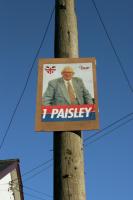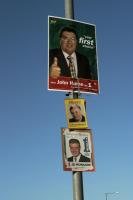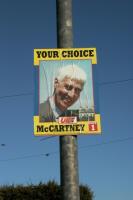
European Election (NI)
|



|
Introduction
The elections on Thursday 10 June 1999 were to elect three Members to the European Parliament (MEPs). For the purpose of the European elections Northern Ireland is treated as a single constituency and voting is by means of proportional representation.European elections in Northern Ireland produce results which are markedly different from local government elections, general elections, or other ad hoc elections. Voters in the European elections have tended to vote for personalities. Ian Paisley, then leader of the Democratic Unionist Party (DUP), has topped the poll since the first European election in 1979. In the 1999 election one question was whether or not John Hume, then leader of the Social, Democratic and Labour Party (SDLP), could beat Paisley to the top position. There was also interest in how Jim Nicholson, the Ulster Unionist Party (UUP) candidate, would fare among conservative UUP voters following the revelation that he had had an extra-marital affair. Both Paisley of the DUP and Robert McCartney, then leader of the United Kingdom Unionist Party (UKUP), fought the election as if it were an opportunity for voters to have a re-run of the referendum on the Good Friday Agreement.
Summary of Results:
Electorate: 1,190,160Total valid vote: 678,809
Spoiled votes: 8,764
Percentage turnout: 57.04%
Quota: 169,703
First Count
Ian Paisley (Democratic Unionist Party) and John Hume (Social Democratic and Labour party) both elected on the first count.
Jim Anderson (Natural Law Party), David Ervine (Progressive Unionist Party), Robert McCartney (United Kingdom Unionist Party) and Sean Neeson (Alliance Party of Northern Ireland) were all eliminated on the first count.
Second Count
Distribution of votes from David Ervine, Robert McCartney, Jim Anderson and Sean Neeson| Candidate and Party |
|
|
| McLaughlin, Mitchel. Sinn Fein (SF) | +1,709 | 119,352 |
| Nicholson, Jim Ulster Unionist Party (UUP) | +43,120 | 162,627 |
Third Count
Distribution of the surplus votes from Ian Paisley.| Candidate and Party |
|
|
| McLaughlin, Mitchel. Sinn Fein (SF) | +32 | 119,384 |
| Nicholson, Jim Ulster Unionist Party (UUP) | +22,162 | 184,789 |
Jim Nicholson (Ulster Unionist Party) was elected on the third count.
CAIN
contains information and source material on the conflict
and politics in Northern Ireland. CAIN is based within Ulster University. |
|
|
|||
|
Last modified :
|
||
|
| ||
 Anderson, James.
Anderson, James. 





